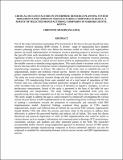| dc.description.abstract | One of the major information technology (IT) investments of the firm in the past decade has been enterprise resource planning (ERP) system. A diverse range of organization have adopted resource planning system which now define the business model on which such organizations operate successful implementation of enterprise resource planning projects is necessary because the pay-offs from such investments for outweigh the costs and the risks. However, there is a significant evident of increasing global implementation failures in enterprise resource planning projects and for this reason, critical success factors (CSF) on implementation success (IS) are of the notable concern to manufacturing organizations. This study aimed to examine critical success factors that may affect the enterprise resource planning projects implementation success amongst manufacturing companies in Kenya. The objective of the study were to establish the role of organizational, project and technical critical success factors on enterprise resource planning project implementation amongst selected manufacturing companies in Nairobi County, Kenya. The study use across-sectional research design and data was analyzed using descriptive statistic technique. 233 manufacturing firms were sampled out of a total target of population of 560. Primary data was collected using standard questioners assigned to managers in selected firms while secondary data was collected via a review of literature on logistics, strategies, as well as performance measurement. Result of the study is presented in the form of the table for easy understanding and interpretation. The study findings were established from sixty two manufacturing firms that responded out of the two hundred and thirty three that were sampled. This study sought to address the gap in actual research by empirically investigating the various critical success factors in ERP implementation in the manufacturing sector in Kenya with the aim of making a contribution towards the promotion of contextually and culturally valid ERP implementation model. Empirical findings examined three groups of CSFs mainly organizational, project and technical that are behind the successful ERP systems, organizations should identify CSFs that affect the process and know when in the process to address them effectively to achieve the perceived benefits and reduces risk of failure. This study has drawn theoretical and practical implication of CSFs in ERP implementation that could be useful to various players such as mangers, information and communication technology (ICT) practitioners, consultants, scholars, and students and other interested parties in the field. The researcher recommended further research using longitudinal approach to determine success of ERP system implementation amongst manufacturing companies in Kenya inferential statistics can also be employed to establish the relationship between critical success factors and ERP implementation success. | en_US |

